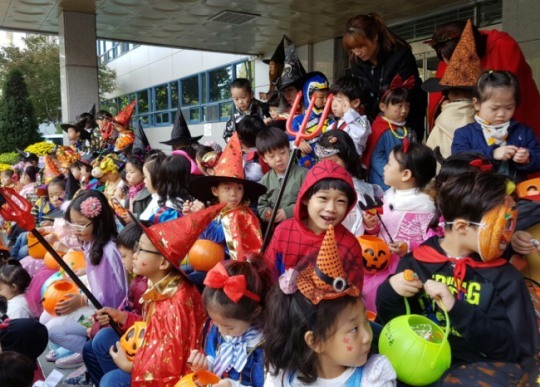Lee Suk-hee does not know much about Halloween, but last Sunday she found herself buying her first Halloween costume for her daughter.
“I don’t really know what Halloween is,” she told The Korea Herald while browsing through rows of Batman, Snow White and witch costumes at a discount store in Yongsan, central Seoul.
“It is my first time buying these clothes because my daughter’s kindergarten announced that they will have a Halloween party,” said Lee, who asked for her name to be changed to preserve anonymity.
Despite being an age-old tradition in many western countries, Halloween is a new phenomenon here.
Once mainly been celebrated by party-loving youngsters and expats in Hongdae or Itaewon, it has more recently found a new audience -- kindergartens.
“Traditional holidays in Korea are rather formal and rigid and may be a little heavy for children. Halloween parties can be a fun opportunity for kids to try out different costumes and culture,” Kwon Jeong-yun, a child education professor at Sungshin Women’s University in Seoul said in a phone interview.
Halloween has its roots in Celtic Ireland during the celebration of seasonal change and harvest. The idea of donning a costume came about from the myth that during this time the worlds of the living and dead were at their closest and it was feared that ghosts would try to possess human bodies. In order to confuse the ghouls people would wear masks. While the myth behind it may have died, the idea of dressing up remains.
 |
Children dressed in Halloween costumes (Yonhap) |
Halloween celebrations at kindergartens first started with English-immersive institutions, but more regular schools are now incorporating it into the yearly calendar, viewing it as a fun event that can introduce kids to another culture.
Unfortunately, it seems that in Korea’s hyper-competitive society where devoted mothers can apparently do everything, Halloween parties can bring out rivalry.
“Does this look ok? I bought a cheap wizard gown last year and my child did not stand out at all in the picture,” a mother posted in a local online mother’s community in Dongtan, Gyeonggi Province.
Instead of it being a fun day for kids, mothers feel under pressure to buy expensive costumes, kindergarten teachers said. There have even been complaints by some mothers because they feel that their costume choice will reflect their financial status. The cost of a costume can vary from 10,000 won to over 100,000 won.
For young parents, this new festival is greeted with interest and worry. Some think that just as Valentines’ Day here has become a big season for buying chocolate and candy, Halloween is driven mainly by marketing.
“It is definitely not a Korean tradition at all. My daughter’s kindergarten held a Halloween party last year but some parents complained and now they don’t do it anymore,” said Shin Sae-young, a 38-year-old mother from Gwangju.
“I also do not see the point of celebrating it. It is a trend created by companies.”
Some kindergartens have moved to take the pressure off mothers by banning any preparation.
“We told parents not to prepare makeup and clothes, because it is a burden on them. We will do face painting and provide costumes at the kindergarten,” said An Hae-jin, a teacher at an English hagwon in Cheonan, South Chungcheong Province.
Experts point out that the day is not just about costumes but is related to religion and culture.
“It is important to properly explain and teach the background of the foreign tradition,” professor Kwon said.
“It is, in part, an anti-religious event. In the US, schools give guidelines on the dress codes to prohibit offensive costumes and also gives the option either to send or not send the kids to school for Christian families. Such guidelines can be applied,” she said.
By Jo He-rim (
herim@heraldcorp.com)








![[Today’s K-pop] Blackpink’s Jennie, Lisa invited to Coachella as solo acts](http://res.heraldm.com/phpwas/restmb_idxmake.php?idx=644&simg=/content/image/2024/11/21/20241121050099_0.jpg)